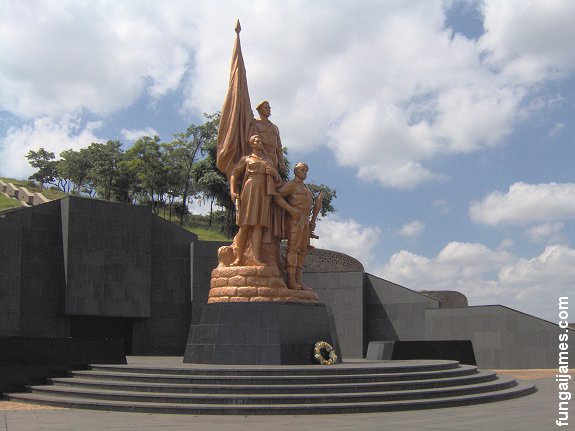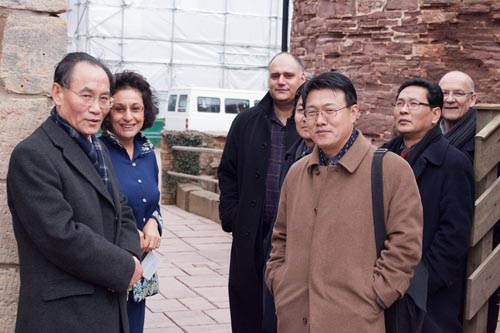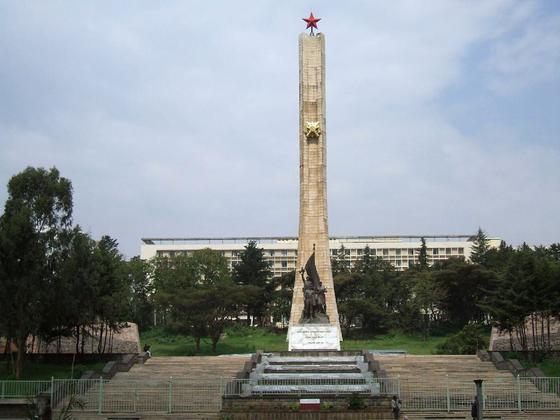UPDATE 2/20/2009): According to the Daily NK:
“Special holiday provisions,” which have long been provided to all the people of North Korea on the three major holidays, Lunar New Year’s Day, Kim Il Sung’s and Kim Jong Il’s birthdays, and provided a rare moment of modest luxury in the year, are becoming scarce and discriminatory in their application by the authorities.
A source from Yangkang Province reported in a telephone interview with Daily NK on the 17th, “There were no holiday provisions in Hyesan provided to the citizens.”
The source explained some of the causes, “In the past, the authorities prepared holiday provisions and handed them over in one lump to each city, county and province. But now, factories, working places or collective farms prepare provisions for associated workers and farmers by themselves. In this situation, cadres cast their obligation to prepare and distribute provisions onto lower managers and take their own portions first. Accordingly, many other citizens cannot have been given any provisions.”
The source from Yangkang Province continued that, “The holiday provisions had continued, even though they were nominal, until now. It was unimaginable that there could be no holiday provisions because even on October 10, 2005, the 60th anniversary of the founding of the Party, and on September 9 last year, on the 60th anniversary of the nation’s’ founding, there were special provisions of some sort.”
Historically, there have generally been three kinds of special provisions on national holidays. The first one is holiday gifts for children consisting of candies, cookies or school supplies; the second is more substantial foodstuffs like pork or liquor for everybody; and lastly the General’s special gifts for cadres and some workers or farmers who achieve impressive results.
“Get holiday provisions for yourselves!”
Until right before Kim Il Sung’s death, on the three holidays, these gifts and provisions could be taken for granted.
However, as the economic situation turned ugly, the special provisions from Pyongyang were all suspended. Since 1998, the holiday provisions have been given only to citizens of Pyongyang, aside from one kilogram of candies and cookies supplied to elementary school students.
Since 2000, the authorities have ordered other work places, factories and collective farms to provide holiday provisions by themselves from their own funds.
The order created side effects. Factories and other work places started mobilizing workers and residents to collect beans, medical herbs and bracken under the pretext of making foreign currency. They allotted certain duties to the People’s Units, factories and farms. For cadres, it appeared to be a significant business.
Regarding the Lunar New Year’s Holiday provisions for 2009, the North Korean authorities issued an instruction on December 20th entitled, “With respect to preparations for 2009 Lunar New Year’s Holiday provisions distinctively under the responsibility of the committee of each level of the Party.” It came from the Guidance Department of the Central Committee of the Party.
The source criticized that, “The cadres have used this occasion to generate benefits for themselves. Households where holiday provisions were given on Lunar New Year’s Day were just those of the “marvelous” cadres’ of the National Security Agency, the People’s Safety Agency, the Ministry of Foreign Trade and the Party.”
“On the 16th, local cadres of the Party were taken rice, pork, liquor, bean oil, and cigarettes as holiday provisions. Besides gifts to the Party in the provinces by each department, cadres of the Guidance Department under the Party in local provinces were given socks and cosmetic products produced in China,” the source reported.
He released rumors of this custom circulating among the people, “Some say that the Party in Poongseo, Yangkang Province exported 300 square meters of timber in early January [nominally in order to prepare for holiday provisions]. And, others say that deer and wild boar were offered to officials of local committees of the Party, the NSA and the PSA of the provinces.”
“When holidays come, only the people without power suffer to make foreign currency to guarantee cadres’ special provisions. Otherwise, they have to offer bribes in order to avoid doing such activities.”
Kim Jong Il’s special gifts flow into seats of power
A source from North Hamkyung Province revealed on the 17th, “For the February 16 holiday, the state supplied the authorities of Pyongyang, Hoiryeong, Samjiyeon and Kaesong Special District with provisions. In Hoiryeong, they received a bottle of bean oil, 500 grams of candies and cookies, soap, toothbrush and toothpaste.”
He additionally reported that, “In some regions of South Hwanghwa and North Pyongan Province, two or three-days of food were provided around February 16.”
The regions where the special provisions were supplied were all selected by the authorities; Hoiryeong, because it is the hometown of Kim Jong Il’s mother, Samjiyeon is the county where Kim Jong Il insists he was born, and Kaesong is a place opened to South Korea so it may have been for propaganda towards foreign visitors.
The source explained, “In 2006, in evaluation meetings for anti-socialism group inspections in Hoiryeong, chairpersons of the People’s Units brought to the attention of the inspectors the fact that many citizens had left their hometown, the Hometown of the Mother (Kim Jong Sook), for China due to the grim reality of their lives. After a petition was reported to the General, on every holiday special supplies have not failed there.”
However, he said, “Although technically I live within the Hoiryeong administrative district, those who live in rural districts, including me, were excluded from the special provisions.”
Meanwhile, Kim Jong Il’s gifts to the official class have not ceased.
“On the General’s birthday, Chief Sectaries of cities, counties and provinces of the Party and other high level cadres in local provinces receive the General’s gifts. Additionally, persons who provided distinguished service to the state or exemplary workers also got gifts, but in Hoiryeong merely seven workers and farmers received special gifts of any sort.”
He criticized, “In the past it was a pleasure that even liquor was provided equally to all the residents, but now it is in the past. Now, it is a happy day only for cadres.”
He expressed the atmosphere of the holiday, “Some singing performances were held to commemorate the birthday by the Union of Democratic Women and Socialist Working Youth League, but there were not many people in the audience. There were not many people on the streets. It was a depressing holiday.”
Regarding this mood, an NGO activist who works for defectors in China analyzed hopefully, “This trend does not imply systematic change in North Korean society. There is one significant point; that in national business regarding Kim’s birthday, centralized authoritarian rule and control are crumbling down.”
UPDATE (2/19/2009): According to the Daily NK:
In commemoration of Kim Jong Il’s birthday on February 16th, 15-days of rations were provided to the citizens of Hyangsan and Woonsan in North Pyongan Province.
According to a source, the ration consisted of 2 kilograms of rice, 2 kilograms of noodles and the rest in corn for households with more than four family members. For small households, a kilogram of rice and noodles were given and the rest in corn. Recently, on the farms, provisions have not been sufficient and stealing has grown difficult, so the expectation of our citizens regarding the special rations have been high.
The source explained, “Since last year, with the increase in the number of guards on farms and the strengthening of house searches, the stealing of food from farms has been absolutely impossible.” For the last several years, as rations failed even for farmers themselves, stealing from collective farms as a means of survival had become commonplace.
The source continued, “Inspections have also been taking place at the county and provincial levels every November and December. With the strengthening of the regulations governing grain, stealing has become more difficult. If one is caught, he or she is taken to a labor detention facility.”
All the citizens of North Korea usually receive some form of commemorative product in honor of Kim Jong Il’s birthday, though it is not always in the form of food.
ORIGINAL POST: Although the practice has become inconsistent since the “Arduous March” of the late 1990’s, each year the DPRK distributes gifts or special provisions in celebration the two leaders’ official birthdays (Kim il Sung: 4/15 & Kim Jong il: 2/16).
The value of one’s gift, however, allegedly depends on one’s rank in society. A common farmer might receive a new pair of socks. A senior Worker’s Party official probably receives a good deal more. The distribution of alcohol is popular. One estimate put the value of these special gifts at USD$20m.
This year, Yonhap informs us that children in Pyongyang will receive domestically manufactured peanut candies:
Choson Sinbo, a Korean language newspaper in Japan that usually echoes Pyongyang’s policy, said peanut candies will be added to the gift list for children this year, following the completion of a production line in Pyongyang Vegetable-Processing Factory.
The foodstuff factory that produces noodle, bread and sweets was newly equipped with a peanut candy production facility at the end of last year as “a governmental measure to enhance the people’s diet,” the report said.
It said all of the ingredients are provided by the government.
Lee Seung-yong, a coordinator of Good Friends, a Seoul-based aid group for North Korea, said the cash-strapped North often has to collect ingredients from its citizens to make the gifts for them.
Only 20 percent of North Korean factories are currently operating due to the lack of electricity and raw materials, according to the Korea Institute for National Unification, a state-run think tank in Seoul.
Though some gifts are manufactured domestically by the people, others are donated by foreigners. Expensive gifts are imported by the leadership.
Last year (February 2008), the Daily NK reported that locals actually resented receiving the gifts to some degree because all of the items were available in the marketplaces. Rather than restricting market activity and providing limited goods via the Public Distribution System (PDS), the story reports that people would prefer the government to simply make it easier to conduct business in the markets.
The DPRK has been placing a lot of focus on building/repairing “foodstuff factories” recently. Here is a link to KCNA stories about “foodstuff factories” via the very helpful Stalin Search Engine.
Read the more here:
N. Korean children to get peanut candies on leader’s birthday
Yonhap
2/3/2009
15-days of Food on the Leader’s Birthday
Daily NK
Jung Kwon Ho
2/19/2009
Un-Socialist Inequality
Daily NK
Lee Sung Jin
2/20/2009



